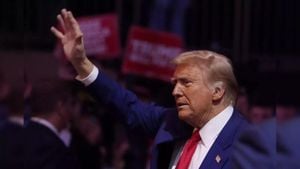Legal turbulence surrounds former President Donald Trump as the dismissal of federal cases against him continues to dominate political discourse. Despite standing at the forefront of several investigations, his legal battles have taken unexpected turns, raising questions about the political and judicial landscapes as the 2024 election approaches.
Earlier this month, Trump faced considerable scrutiny when the Justice Department announced the dropping of federal charges against him linked to alleged mishandling of classified documents. The case hinged on whether Trump's actions warranted prosecution under federal law. Prosecutors reflected on the complexity of the evidence surrounding these charges, concluding they no longer held sufficient weight to pursue the case, leading to its dismissal.
The decision surprised legal analysts. Many had speculated about the underlying evidence and potential liabilities Trump faced. According to legal experts, the dismissal may set significant precedents for how federal cases involving high-profile figures, especially politicians, are handled moving forward.
Trump's legal team hailed the dismissal as a victory. They alleged the original investigation was politically motivated, aiming to undermine his candidacy for the upcoming presidential race. Trump himself took to social media, posting his gratitude for what he termed "a triumph of justice over political malice." This public sentiment resonates strongly with his supporters, many of whom view the legal proceedings as part of broader partisan attacks.
But the dismissal did not wash away all of Trump's legal troubles. He still faces multiple civil lawsuits and investigations at both state and federal levels. The New York Attorney General's office is pursuing claims against Trump and his family business for alleged fraud, complicate him as he gears up for his electoral campaign.
Political analysts are closely monitoring these developments. They argue Trump's legal issues could either bolster his base, as they frame him as a victim of undue scrutiny, or they could alienate moderate voters concerned about his controversies. The Democratic critique positions these dismissals as symptoms of judicial leniency toward powerful politicians, pointing to the broader ramifications for accountability within the American legal system.
The federal case dismissals are particularly significant against the backdrop of rising political tensions. Many argue Trump's actions have contributed to the fractious nature of current Republican primaries, with candidates divided over the appropriateness of Trump's past conduct. The Republican Party finds itself at crossroads, forced to grapple with the legacy of Trump's presidency and the potential impact of his legal challenges on the party's future.
Michigan Representatives for Trump's loyalists have expressed confidence, insisting legal setbacks only ignite more enthusiasm within the party. A recent poll showed many Republicans remain steadfastly supportive, with 70% approving of Trump's actions during his presidency.
Meanwhile, the Democrats are seizing the moment to regain control of the narrative. They anticipate leveraging the circumstances surrounding Trump's legal matters to rally Democrats and swing voters. Recent projections indicate favorable outcomes for Democratic candidates if they can effectively connect Trump's legal dilemmas to broader concerns about competency and ethical governance.
Examining the larger political picture, the dismissal of charges against Trump poses challenges and opportunities for both sides of the aisle. While Trump may view this moment as validation, his critics assert it reflects the need for systematic changes within the U.S. judiciary. Regardless, the political intrigue surrounding Trump's dismissals continues to evolve, leaving citizens to navigate this compelling saga with varying perspectives.
The coming months will demand attention as political leaders gear up for the election, facing the intertwining threads of law, power, and public opinion, raising the stakes on what voters truly desire from their leaders.



